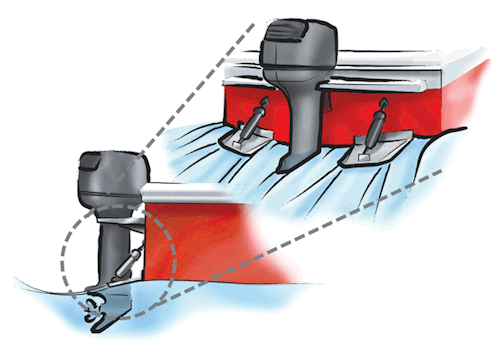Take A Trim Tab Approach To Climate Change – Business focus
– – – – –
from the curator: Last fall, Amy Edmondson, Novartis Professor of Leadership and Management at Harvard Business School, wrote a thought provoking article describing the importance of business leaders “to get off the sidelines and make a difference.” I couldn’t agree more!
The Soil-to-Table mailing has assumed a recipe of 3-parts food, and 1-part environmental advocacy due to a required interdisciplinary “solutions of change” approach needed to rectify these closely tied systemic problems.
As Professor Edmondson discusses, the only force with a quick enough cadence to address spiraling climate and health issues is the free market. The good news, for the health of the planet and its beings, the consumer seems ready to buy based on value, provenance and a storyline for the betterment of the future. In the book ‘Immoderate Greatness’, William Ophuls navigates history with a summary of why civilizations inevitably fail. Hubris, corruption and greed seem constants throughout social anthropology, but the change agent in our modern world will be our ability to break from our apeish hard-wired short-term perspective that has plagued man’s past great empires and start to plan for our future, our kid’s future, and hopefully an evolved cultural belief of seventh generation sustainability – which may take some convincing weather events and food shortages amplified across the broad shoulders of the information age. The ability to quantifying how climate change will affect and effect personal and cultural well-being will expedite adoption of this forward thinking, especially when properly delivered to capital market gatekeepers as a pragmatic multi-prong advantage to protect long-horizon real assets – while also harvesting new cash-flow opportunities by fueling products that best align with the ethos of GenX, Millennial and soon GenZ consumers.
Paulson, Bloomberg and Stayer seem to have the proper formula with Risky Business – where a fiscally savvy appeal to the insurance mainstay and large scale institutional investors should act as unprecedented trim tabs that will quickly influence markets, and later sway a reactionary political system. IMO – the Risky Business approach should act as a framework for the future of food that will have to take into account the skyrocketing cost of healthcare, environmental impact, misplaced subsidies when quantifying the "true costs” of modern food production and systems.

Take A Trim Tab Approach To Climate Change | FORBES:
The “bully pulpit”—a term coined by Theodore Roosevelt back when the word “bully” meant terrific—originally referred to the US presidency and its tremendous potential for speaking out and influencing public opinion. Nowadays, the term describes any position with the potential to get the public’s attention, and thereby educate people to influence the tide of events.
Prominent business leaders have a bully pulpit, if they want to take it, on the issue of climate change and environmental sustainability. Today’s business leaders have visibility and media access that is unparalleled in history. No longer the gray-flannel-suited organization men of yesterday avoiding the spotlight even in senior positions, today’s businessmen and women have Facebook pages, media offices, press releases, and much more at their disposal. But do they use these pulpits well?
Large and growing numbers of business leaders acknowledge, behind closed doors—and some doors that are distinctly ajar—the threats to future generations, and even to business and society in the near term, created by their operations. For just one example, earlier this year a New York Times article reported that a growing number of business leaders are viewing climate change as a threat to supply chains and thus ultimately bottom lines. A good start. But CEOs of global companies like Coca-Cola , the company figuring most prominently in the Times piece, and Nike (also mentioned) must start to recognize and take responsibility for using the bully pulpit that they in fact occupy.
When elected officials don’t own this crucial responsibility, other leaders in society must step into the vacuum. Why not business? Often depicted as greedy and shortsighted, consumed with this quarter’s profits and blind to the larger impact of their actions on society, business leaders face a crucial opportunity today to change that perception (and that reality).
Meanwhile, behind the scenes, many thoughtful leaders throw up their arms, thinking, understandably, that my company is just a drop in the bucket. “Until regulations happen,” they muse (and they will, eventually, just perhaps not fast enough to make the difference the world sorely needs), “there’s really nothing I, or my company, can do to make a difference.” That’s where the “trim tab” comes in.
Quoting Wikipedia, “Trim tabs are small surfaces connected to the trailing edge of a larger control surface on a boat or aircraft” (e.g., a rudder on an ocean liner) to control or alter the direction of a very large craft (e.g., the ocean liner itself). How do you change the direction of an enormous ship like the Queen Mary? The rudder itself is far too big to be easily maneuvered by a single skipper. The trim tab, however, is tiny and thus easy for the captain to shift. The small trim tab’s movement then creates a low-pressure zone that pulls the rudder around. Inventor and futurist Buckminster Fuller, with whom I worked years ago as a geodesic engineer, pointed out that anyone can act as a trim tab, in part by recognizing the potential downstream influence of small, high-leverage actions pointing in the right new direction. The trim tab’s tiny movement has leverage. The right shift in the right place at the right time.
Business leaders must recognize the trim tab principle. Don’t wait for the rest of the industry to act first . Just get started. Contribute, through action, to building pressure that pulls on the rudder and ultimately changes the course of the ocean liner. Of course when you’re changing social systems, it’s hard to know the precise mechanics of the influence your business actions can and will have. But it’s a given that your business won’t have any influence at all if no changes are made.
Pick your approach. Bully pulpit (advocacy, voice) as a means of influence? Or trim tab (small, well-placed actions that start a trend) as a means of influence? Your pick.
Either way, it’s time for business leaders to get off the sidelines and make a difference.
About the author: Amy Edmondson is the Novartis Professor of Leadership and Management at Harvard Business School.

